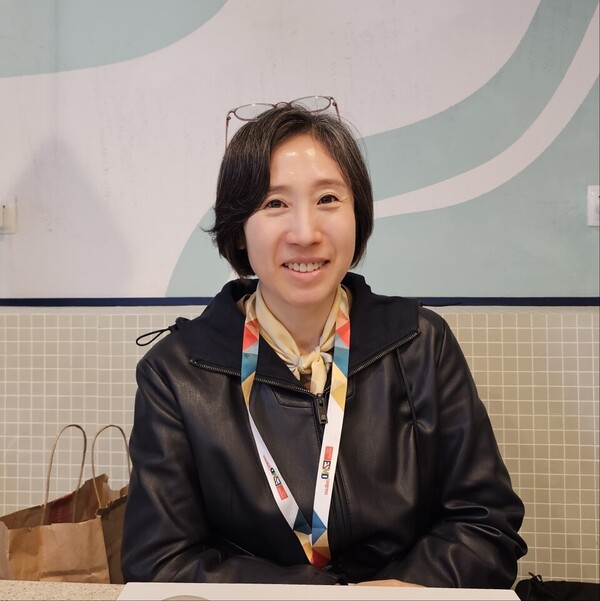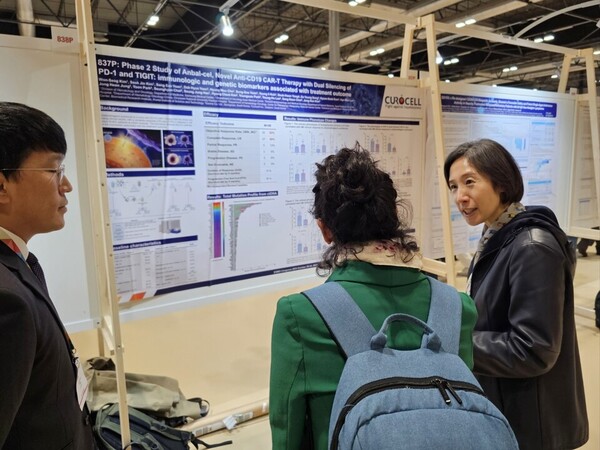MADRID -- By Kim Chan-hyuk Korea Biomedical Review correspondent -- A Korean company was honored with the title of "Best Poster" at the European Society for Medical Oncology Annual Meeting (ESMO 2023), the largest cancer society in Europe and one of the top three cancer societies in the world.
Curocell, a Korean CAR-T therapy developer, is that company.
At the conference, Curocell presented a poster, “Phase II study of Anbal-cel, a novel anti-CD19 CAR-T therapy that dual inhibits PD-1 and TIGIT: Drug properties, immunological and genetic biomarkers related to treatment outcomes and toxicity," and was awarded the best poster by the ESMO organizers.
While various Korean pharmaceutical and biotechnology companies attended the conference to present the results of their research on new drug candidates, Curocell was recognized for its research on Anbal-cel (anbalcabtagene autoleucel , CRC01), a homegrown CAR-T treatment candidate by winning the best poster.
In particular, Curocell plans to complete phase 2 of the clinical trial of Anbal-cel within the year and apply for a product license from the Ministry of Food and Drug Safety in the second half of next year. Anbal-cel is a CD19-targeted CAR-T therapy applied by Curocell's platform technology OVIS, currently in phase 2 trial for patients with diffuse large B-cell lymphoma (DLBCL).
Korea Biomedical Review sat downwith Kim Jong-ran, Vice President and Head of the Clinical Development Center at Curocell, who presented a poster at ESMO, to find out why the company attended the conference, what the poster meant to it, and plans for future CAR-T therapy development.

Question: Why did Curocell decide to attend ESMO this year, and what was the purpose of the Anbal-cel study?
Answer: We attended the congress to present our Anbal-cel biomarker research results. One of the most important things for us is to clearly understand the MOA (mechanism of action) of our in-house platform, OVIS because it is a technology that will be applied to Anbal-cel and other pipelines. Our goal is to develop a solid tumor-targeted CAR-T therapy, if not now, then someday.
Q: Can you explain the significance of this research and its achievements?
A: Among the exhaustion markers expressed in leukapheresis-collected preparations, the expression of PD-1 and TIGIT was not significantly different between the CR and non-CR groups at six months, interpreted as the knock-down effect of Anbal-cel on PD-1 and TIGIT. However, the expression of LAG-3 was significantly different between CR and non-CR groups.
Furthermore, we confirmed that the Th2 immune response of CD4 cells after Anbal-cel administration is important for the duration of the response. We will continue to analyze additional biomarkers to further our understanding until final clinical results are analyzed.
Q: Your company plans to finalize the phase 2 study of Anbal-cel by the end of the year and submit a new drug application (NDA) in the second half of next year. When will the final phase 2 results be released, and how can we access them?
A: We plan to complete the analysis of the final clinical results in the second quarter of 2024 and will present the final clinical results and biomarker analysis at an appropriate international conference in the second half of 2024.
Q: Anbal-cel is the first homegrown CAR-T therapy close to commercialization. We are curious about the response from the overseas medical professionals, researchers, or corporate representatives you met at the conference.
A: There is a lot of interest in the OVIS platform because it can maximize the therapeutic effectiveness of CAR-T development not only for hematological cancers but also for solid tumors. I think this may have contributed to the Best Poster award.
Q: In the field of solid tumors, you are conducting research on six diseases, including prostate cancer and lung cancer. Which of these indications do you expect to be the first to develop a treatment for?
A: Our T-cell lymphoma pipeline is the most advanced, and we expect it to be a first-in-class drug by applying our differentiated platform.
Q: What advantages do you think Anbal-cel has over existing CAR-T therapies or those under development?
A: To maximize the therapeutic effect of CAR-T, it is important that the CAR-T cells do not burn out and remain functional until all cancer cells are destroyed. It is also well known that PD-1 and TIGIT play an important role in the tumor microenvironment and the function of immune cells.
Anbal-cel was developed to maximize therapeutic benefit following CAR-T cell administration by knocking down PD-1 and TIGIT, and interim results from the Anbal-cel phase 2 study presented at the International Conference on Lymphoma in June confirmed this clinical significance. We plan to confirm these clinical implications with a final analysis of the results in 2024.

Q: When do you expect Anbalsel to enter the global market?
A: We are currently in active discussions with various international business partners. We plan to enter the international market based on the results of the APOLLO-DLBCL study, a third-line DLBCL trial.
Q: After the success of Kymriah, more than 100 companies and research institutes are developing CAR-T therapies in Korea. How do you expect the domestic and international CAR-T therapeutic market to grow, and how will competition change?
A: CAR-T therapies must fulfill several requirements to be commercially successful. It must have excellent clinical performance through differentiated technology and have an approval pathway under the Act on the Safety and Support of Advanced Regenerative Medicine and Advanced Biologics. It must also have the production technology and capacity for commercial production.
Curocell has proven its differentiated CAR-T technology and clinical trial results through oral presentations at international conferences. It has secured the requirements to start commercialization at the same time as the first domestic approval, including the largest GMP facility in Korea, which was completed in 2023, and a quality inspection method that allows production to be completed and administered to patients within three weeks.
Related articles
- [ESMO 2023] Global competition for anticancer therapies opens yearly event in Europe
- Curocell completes phase 2 study of CAR-T therapy for DLBCL
- Korean pharma firms gear up for ESMO 2023, Europe's premier cancer conference
- Curocell sees ‘Kosdaq listing in November barring unexpected variables’
- [CPHI 2023] Prestige Biopharma embraces open innovation for new antibody drugs
- [ESMO 2023] GI Innovation lays ground for Keytruda’s clinical trials
- Curocell confirms IPO price, gears up for Kosdaq listing
- Following the US, Korean regulator obligates monitoring of CAR-T cell therapies
- Bill proposed to expand medical institutions providing CAR-T treatment
- Curocell receives government funding to expand CAR-T treatment into lupus

